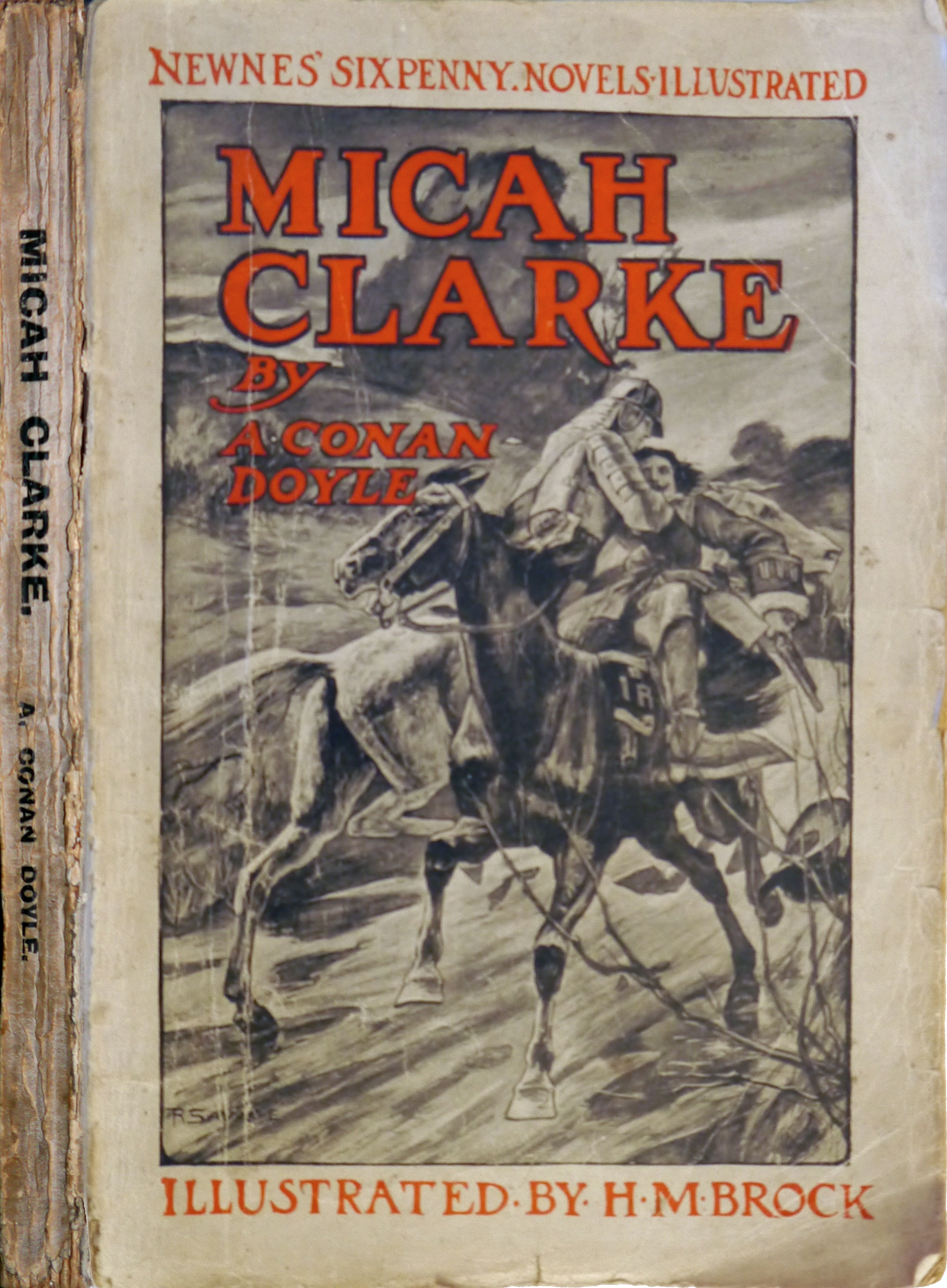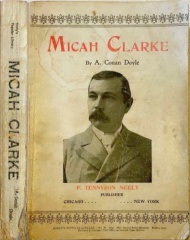Micah Clarke
' Micah Clarke ' Sir Arthur Conan Doyle novel about the Monmouth Rebellion from 1889.
H.M.Brock illustration 1903 edition
I am very grateful to the 'ECW & Stuart era Fiction' Facebook group for directing me to Sir Arthur Conan Doyle's novel 'Micah Clarke- His Statement As Made To His Three Grandchildren Joseph, Gervais, and Rueben During The Hard Winter of 1734'.
The images are taken from the Sir Arthur Conan Doyle Encyclopedia website and their use is much appreciated
https://www.arthur-conan-doyle.com
''Micah Clarke' is a fictionalised account of a young veteran of the doomed 1685 West Country rebellion led by the Duke of Monmouth against (Roman Catholic) James II ascending the throne of upon the death of Charles II.
Micah Clarke, born in Havant, remains in the district and heads west, which offers more scope for adventure, as he joins the rebellion when it is well underway. It's a strictly boys tale, women do not feature apart from a worrying mother back home. There is an obligatory highwayman, a nest of smugglers, an opportunistic rich fellow who is keen to remain on the winning side, a fop who rides bravely into battle. Hints of espionage and a secret network. And great fun to read.
The novel is partisan......the author tends to view James II as scheming to impose the Roman Catholic faith on an unwilling population. Therefore, in 1685 the followers of the Protestant Duke of Monmouth, are conscientious, brave, liberty loving, and genuine in their faith, deliberately idealised. The worst they can do it to deliver boring sermons. Apart from embarking on a Reformation style rampage when they reach Wells Cathedral.
Of course there is the argument that a historical novelist can be as one sided as they like. Yet perhaps the book would have been even better if a less straightforward 'heroes and villains ' approach was taken. Part of the tragedy of war occurs when people on either side can have honourable motives.
Of course there is the argument that a historical novelist can be as one sided as they like. Yet perhaps the book would have been even better if a less straightforward 'heroes and villains ' approach was taken. Part of the tragedy of war occurs when people on either side can have honourable motives.
And a novel is created in it's own historical era. 'Micah Clarke' tells us a lot about the 1880's 'Whig' view - that history is moving towards the ideal of a liberal society ruled by a sovereign in conjunction with a parliament that meets and is re-elected on a regular basis. Monmouth is like a prophet, preparing the way for the 'Glorious' revolution of 1689 . In this model, the reign of Catholic James II is some sort of aberration that needs removing, complete with his boorish and cruel supporters, who are to destined be mocked by the inevitable course of progress.
Yet for all its partisan approach to the complexities of a rebellion which could have led to a ghastly civil war if not quashed to quickly, I love the fact that people in Conan-Doyle's world can be religious without hypocrisy or hidden agenda. It's marvellous to have good old fashion flawed heroes, who seem to believe in their cause. There is little evidence of cynicism, irony or paralysing pessimism.
T.Tennyson-Newly illustration 1894 edition
Sir Arthur Ignatius Conan Doyle lived in Portsmouth from 1882-1890. 'Micah Clarke', first published in 1889, was one of his first books . His two most famous Characters, Sherlock Holmes and Doctor Watson, had only just been introduced via a short story 'A Study in Scarlet' , published in 1888. Conan Doyle made a contribution to life in Portsmouth and Southsea, as a practising doctor, and supporter of the local football club and Spiritualist church.
It is hard to find evidence of any men of Portsmouth who ventured forth to support Monmouth in 1685. Whilst playing the 'Protestant Duke' , rallying the people against James Duke of York during the Succession Crisis, the Duke of Monmouth made a series of visits to Chichester from 1679-1683. , There is an account of some thousand people gathering at the Market Cross in Chichester in February 1682 to greet Monmouth including men from Portsmouth who had travelled using dog-carts. Source: Chichester Papers Number 46/ 1964 (Annual local history bulletin. ) Whether Conan Doyle had stumbled across some local connection, or just decided to set the novel locally as a literary device, is not clear.
The use of language in 'Micah Clarke' is superb. Slightly archaic - here is a random extract from chapter XII ' Of Certain Passages Upon the Moor'.
" ‘How say ye,’ he asked, turning upon us, ‘fight ye for Baal or for the Lord? He who is not with us is against us.’
‘Which is the side of Baal, most reverend sir, and which of the Lord?’ asked Sir Gervas Jerome. ‘Methinks if you were to speak plain English instead of Hebrew we might come to an understanding sooner.’
‘This is no time for light words,’ the minister cried, with a flush of anger upon his face. ‘If ye would keep your skins whole, tell me, are ye for the bloody usurper James Stuart, or are ye for his most Protestant Majesty King Monmouth?’
‘What! He hath come to the title already!’ exclaimed Saxon. ‘Know then that we are four unworthy vessels upon our way to offer our services to the Protestant cause.’
‘He lies, good Master Pettigrue, he lies most foully,’ shouted a burly fellow from the edge of the crowd. ‘Who ever saw a good Protestant in such a Punchinello dress as yonder? Is not Amalekite written upon his raiment? Is he not attired as becometh the bridegroom of the harlot of Rome? Why then should we not smite him?’ "
There is such a conscious attempt to write dialogue using expressions that 17th century non-conformists might use. Which adds to the novel's charm.
Finally it's worth mentioning that Conan Doyle wrote a few of his own research notes into the Rebellion and the defeat at the Battle of Sedgemoor into an appendix at the end of the novel.
Micah Clarke Gutenberg on line text
The Sir Arthur Conan Doyle Encyclopedia entry on 'Micah Clarke'.




Comments
Post a Comment